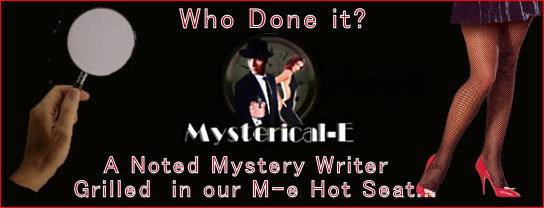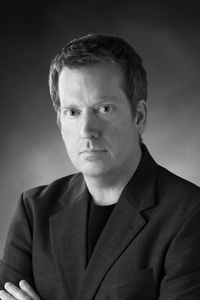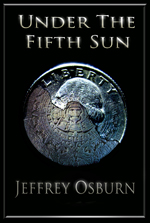 |
An Interview With by Montiese McKenzie
Jeffrey Osburn leverages his years of personal and professional experience working and traveling in Latin America to create realistic fiction that is both engaging and enlightening. His debut novel, Under the Fifth Sun (StoneGarden Publishing, March 2009), is a geopolitical thriller that brings to life the severe threats that engulf the U.S.-Mexico border, such as narco-terrorism, border security, drug smuggling, and human trafficking. Osburn lives in Fort Worth , Texas , with his wife Rosalinda, their daughter Ashley and son Travis. MM: What is your approach to writing a novel: that is, do you outline or not? Do you keep files and piles of notes? JO: My approach is a hybrid of sorts. Since my chosen genre is reality-based geopolitical fiction, research is the key element. I begin with a main premise and a basic outline, and then modify and adapt as the research reveals new information. There are always unexpected twists and turns; that's the part of the process that intrigues me. I use email alerts from CNN, Yahoo News, and Google to collect topical information each time an article or blog uses a key word. I save the relevant information on a memory stick I keep with me at all times, organizing it by project in separate folders as I'm usually working on multiple tasks. I call this process “information scrap booking”. I flesh out and update the outline to reflect changes as they occur, adding more details to incorporate into the manuscript as fresh ideas pop into my mind. I religiously maintain a spreadsheet that lists the basic information about all characters, both major and minor. The left-hand column contains the character name, and then the title, place, and relationship(s) to other characters fill the columns to the right. This part is indispensable for me as my novels have multiple concurrent story lines and over sixty characters to keep up with.
MM: What are some of the tricks, pitfalls, etc. that you need to keep in mind when writing a mystery novel/story? JO: My fiction, based on real events, must be credible and believable; that is tantamount to success in this genre. Besides the exhaustive research, I seek out experts in the more specialized subject matters to validate my assumptions. As Mark Twain said, “The difference between fiction and non-fiction is that fiction must be absolutely believable. The late Gary Jennings excelled at creating “verisimilitude” by gathering hundreds of details, many of them arcane and obscure, in order to establish credibility in his subject matter.
MM: What is it that kick starts a project for you: a character, a situation, or…? JO: I look for lesser-known happenings in other countries that are critically important for Americans to understand and that will have an impact on the U.S. In Under the Fifth Sun , I am calling out for Americans to understand the stakes at risk we're dealing with: narco-terrorism—the drug war—and the importance of working closely with Mexico to stem the tide of violence that will make its way north of the border.
MM: What started you in writing? JO: It has been a longstanding dream of mine to start—and finish—writing a novel. Signing up with a great publisher (StoneGarden) and seeing my book in print were beyond my expectations.
MM: What keeps you writing? What inspires you? JO: I write for the love of writing; it has become my avocation and my method of creative expression. I find inspiration in many things: in the pleasure that comes from the often-daunting task of pulling it all together, in the joy of working with my editor and friend, Rob Starr. Oddly enough, my frequent inspiration comes from reading the mediocre works of authors that receive seven-digit deals and have become household names!
MM: Can you tell us a bit about the first story you had published -- how did that come about? And how do you feel about it now, i.e. would you like to change it and how? JO: I spend a lot of time in Mexico and keep up with current events there: the complex political state of affairs, the brutal violence and power of the drug cartels, and the widespread corruption that permeates every level of government. I wanted to create a story that would fast-forward into the near future and show how these issues would impact the United States . The opening scene of Fifth Sun was adapted from an actual incursion made by a rogue, Mexican army unit across the border near El Paso , Texas in support of a drug shipment into the U.S. Fifth Sun holds a special place in my heart as my first published work, but I believe my best writing is still ahead of me. If I could change something, I would create a glossary of terms—mostly government agencies and their abbreviations—to help clarify for the reader.
MM: How have you grown as a writer? JO: Exposition has always flowed naturally for me, but I've worked hard to improve on the “showing” rather than the “telling” through great dialogue. I also think a style has emerged that enhances the flow of the novel, and my writing is much tighter. I've improved on the fundamentals, such as avoiding the use of the passive voice and weeding out the unnecessary words. Nothing has helped me grow more as a writer than writing—exercising my craft—and working with a great editor.
MM: What are the three most important pieces of advice you'd give to writers? JO: Know your motivation – write for the right reasons. If you take on a project for solely for financial rewards and not for the passion for writing, you may want to consider a different career path. Know your subject – become an expert at what you decide to write, no matter the genre. Each character, each setting, every detail of every scene should become real in your mind. If it's not real to you it cannot be real to your reader. Know your commitment level – do you have the discipline and the skills required to start and finish your task? Can you dedicate the necessary time for writing while maintaining balance in the other important areas of your life? Are you willing to make the commitment of time and money to promote and market your work?
MM: How long does it generally take you to complete a novel – from conception to completion? JO: I find it takes nine to twelve months of writing or researching for about three hours a day—practically every single day.
MM: How many revisions do you normally go through when writing a novel? JO: Fortunately, I have not experienced a major re-write but I always re-read and make minor tweaks five or six times before the publisher creates the galleys. I'm a big believer in the polishing and refinement process.
MM: What's the most difficult stage in the writing for you? JO: Waiting for publishing day to arrive!
MM: Who are the authors who you admire most, who inspire you, whose writing you think is most beautiful, moving, exciting? JO: It's a wide-ranging list in a number of genres…Humberto Eco, Erik Larson, Gary Jennings, Anne Rice, Mark Danielewsky, James Michener, Tom Clancy, George Orwell, C.S. Lewis…Voltaire, Tolstoy, Conan Doyle, Hemmingway, Carol, Joyce…I love the poetry of T.S. Eliot, and the Biblical writers—so many authors in so many areas of literature.
MM: Are there authors who you think are much better at spinning a plot as opposed to writing beautiful prose? How about the reverse of that? JO: Certainly, Clancy and Grisham are authors who weave great tales (especially their earliest works) though lacking in great literary qualities. I can't think of any good examples of the reverse, however. Beautiful prose without a great plot would never hold my interest.
MM: What do you find most satisfying in a book: a great plot, beautiful writing, fully realized characters? JO: For me it's plot, followed closely by great character development, and then beautiful writing.
MM: In your own work, what do you think you are strongest at: plot, beautiful prose, character? Or something else? JO: I believe my strongest attribute is plot. I strive to make my characters real and believable, but beautiful prose? My focus is simple, effective writing.
MM: How do you plot a mystery or a thriller – what stymies you most, what do you find easiest? JO: I strive to create the unexpected, the unforeseen, the unimagined. I'm the type of person who usually figures out the next twist in a movie before it happens, and I'm thrilled when I'm wrong. I have strong sequential reasoning skills that help me to quickly advance a plot to it's logical conclusion. It is then that I look for the opportunity to introduce the unexpected turn.
MM: What advice can you give on plotting a mystery? JO: Be cautious of how you choose the timing to reveal the plot, and avoid overusing “special knowledge” characters, those who have the answers without adequately developing how they've learned the information. Use conflict as the catalyst for moving the plot forward; there should be some degree of conflict on practically every page.
MM: Does the world you create in your non-series novels continue to live in your mind long after you've completed the novel? What implications does that have in terms of wanting to do a series in the same setting? JO : Fifth Sun is the first in a loosely connected series of three books. The plot and the setting change, but a handful of central characters remains.
MM: If you have a series: When doing a series, how "into" the world of that series do you get? Do you constantly think about that world and compare it to reality, changing it or fixing it as you go along? JO: I get completely absorbed into the world of my novel—until I start the next. I am able to compartmentalize and move on when it's time, yet more than once in conversation, I've used a character name rather than the real-world person the character is based on. With my brand of fiction, I constantly compare my series to actual events. The real danger of writing a series is to erect artificial boundaries that force you down a certain path. Predictability equates to a boring read. Characters that are common to a series can be a part of a story that happens anywhere, so why use location constraints if it is not essential to the plot. I've had to learn to write a sequel novel as if the previous story did not exist and the reader had no prior knowledge of the characters.
MM: What other kinds of writing do you do? JO: Precious little, since I have a day gig that pays the light bill. I maintain a blog, write marketing materials for my books, press releases and such.
MM: What tips do you have for beginning writers? JO: No one hires a person for a skilled job without having the proper qualifications. A teacher could not get a job as a music professor without a degree and specialization in that field. Please take the time to learn the craft of writing, beginning with good grammar and punctuation. Nothing will undermine your credibility faster than poor sentence structure, spelling errors, and the like.
MM: What about readers – how have they received your books – do you hear from them, have any problems arisen, or any good/funny/touching experiences happened with regard to readers? What kind of fan mail do you get? Have you developed any friendships with fans over the years? What do your fans most like about your books? JO: I'm really looking forward to the interaction with my readers, but I'm just a few days away from having my first novel available for purchase.
MM: Is the publication of each book as thrilling as that first one? JO: Can't wait to find out, but I have 13 months to go for number two.
MM: What are your goals as a writer? JO: To grow and develop my writing skills, venture into non-fiction, and eventually write full time (without starving).
MM: Why do you think mystery is so popular? JO: Mystery is a common element in many types of literature, not just in “mystery” novels. The intrigue of the unknown is what keeps readers turning the pages. The careful revealing of the layers of the plot—and often, withholding some details of the plot—adds to the tension and the conflict that makes a great story.
MM: Why has mystery spawned so many sub-genres? JO: The proliferation of information through electronic and traditional media has sparked heightened interest in readers who have become savvier to mysteries. Finding new ways to express original stories and challenge today's readers is a natural progression of this trend.
MM: Talk about your most recent book and what it means to you. JO: My latest book, tentatively entitled The Miami Manifesto , is the second in a series of geopolitical thrillers. It's set in Cuba after the Castro brothers are at last gone, and provides my conclusion to the question “What happens after the 50-year dictatorship ends?”
MM: What sparked the idea? How long had you had this idea before starting to write? JO: Again, current events—watching what's happening in Cuba and Venezuela —stimulated the original thoughts. Cuba is one of the world's last communist countries; how will the people of Cuba react once they have an opportunity to embrace democracy? Will other socialist countries such as Venezuela stake a claim there? The idea came to me as I was about halfway through the previous book.
MM: Did you feel compelled to write this book? About this subject? JO: Yes, I believe the American people should understand what the stakes are in a communist country less than 100 miles away from our shore. One of the most dangerous men in the hemisphere—Hugo Chavez—has insinuated himself into the politics and economy of Cuba , and the Chinese have oil interests in the waters off Cuba 's coast. It is a scary scenario developing and the United States needs to be prepared.
MM: How did you approach the planning and writing? Did you prepare an outline? Would you share your outlining and preparation processes? JO: My approach was the same as the first: an “executive summary-level” plot, a rudimentary outline, and tons of research—my “information scrap booking”. I added new levels to the outline and more detail as the research yielded new information, relying heavily on news outlets, email alerts, government directives, etc. At times, I think my approach has more in common with a college research project or a National Intelligence Estimate than a novel.
MM: How long did it take to complete it? What was your least favorite part in the writing of the book? JO: I finished the book in less than nine months. I have yet to come across a part of the process I don't enjoy, except waiting for publishing day. So once again—in the words of Tom Petty—the waiting is the hardest part.
MM: What do you like best about it? Which are your favorite characters and why? Which are your favorite moments in the story? JO: It's a tighter novel than the first, better flow, and much better character development. In addition, it is timely, contemporary, and relevant. My favorite character is Customs and Border Protection pilot Adrian Rangel. He is the protagonist of the book, and is a “real” guy with “real” problems to overcome. In a twisted, geeky way, my favorite part was researching and deciding how to convincingly design and launch a WMD used by a country hostile to the U.S.—a weaponized strain of the avian flu virus. In an emotionally satisfying way, it's following Rangel's agonizing journey to the moment where he says: “I'm Adrian , and I'm an alcoholic.” |
|
|
Past issues and stories
pre 2005.
Subscribe to our mailing
list for announcements.
Submit your work.
Advertise with us.
Contact us.
Forums, blogs, fan clubs,
and more.
About Mysterical-E.
Listen online or download
to go.
|
|
|
 |
 |



